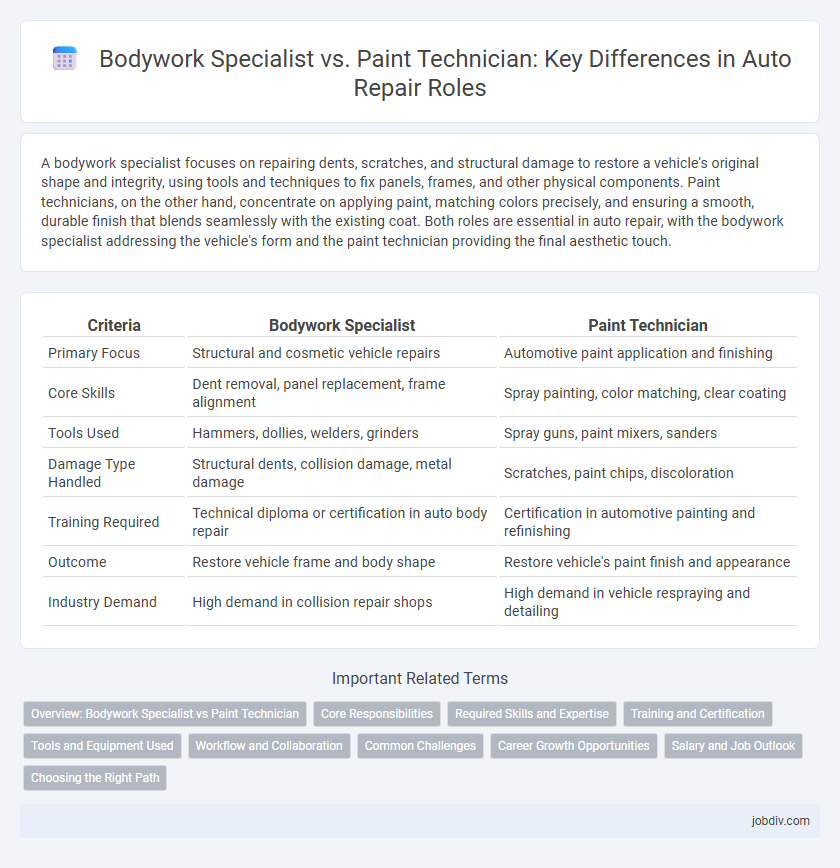A bodywork specialist focuses on repairing dents, scratches, and structural damage to restore a vehicle's original shape and integrity, using tools and techniques to fix panels, frames, and other physical components. Paint technicians, on the other hand, concentrate on applying paint, matching colors precisely, and ensuring a smooth, durable finish that blends seamlessly with the existing coat. Both roles are essential in auto repair, with the bodywork specialist addressing the vehicle's form and the paint technician providing the final aesthetic touch.
Table of Comparison
| Criteria | Bodywork Specialist | Paint Technician |
|---|---|---|
| Primary Focus | Structural and cosmetic vehicle repairs | Automotive paint application and finishing |
| Core Skills | Dent removal, panel replacement, frame alignment | Spray painting, color matching, clear coating |
| Tools Used | Hammers, dollies, welders, grinders | Spray guns, paint mixers, sanders |
| Damage Type Handled | Structural dents, collision damage, metal damage | Scratches, paint chips, discoloration |
| Training Required | Technical diploma or certification in auto body repair | Certification in automotive painting and refinishing |
| Outcome | Restore vehicle frame and body shape | Restore vehicle's paint finish and appearance |
| Industry Demand | High demand in collision repair shops | High demand in vehicle respraying and detailing |
Overview: Bodywork Specialist vs Paint Technician
A Bodywork Specialist is skilled in repairing structural damage, dent removal, and restoring vehicle frames to factory specifications using tools like frame straighteners and welding equipment. A Paint Technician focuses on preparing surfaces, applying primers, paints, and clear coats, ensuring a flawless finish with techniques such as color matching and spray gun operation. Both roles require precision but specialize in different stages of auto collision repair to achieve optimal vehicle restoration.
Core Responsibilities
A Bodywork Specialist focuses primarily on structural repairs, including frame alignment, dent removal, and panel replacement to restore a vehicle's shape and integrity. A Paint Technician specializes in surface preparation, color matching, and applying paint coatings to ensure flawless finishes and long-lasting protection. Both roles require precise skills but address different stages of vehicle restoration within the auto repair process.
Required Skills and Expertise
Bodywork specialists require in-depth knowledge of metal shaping, welding, and structural repair techniques to restore vehicle frames and panels to factory standards. Paint technicians possess expertise in surface preparation, color matching, and applying finishes with precision to achieve a flawless, durable coat. Both roles demand an understanding of automotive materials and adherence to safety regulations, but bodywork specialists focus more on mechanical restoration while paint technicians specialize in aesthetic refinement.
Training and Certification
Bodywork specialists undergo extensive training in structural repair, metalwork, and frame straightening to restore vehicle integrity after collisions. Paint technicians receive specialized certification in color matching, paint application, and finishes, ensuring seamless blending and durability. Both require continuous education on evolving industry standards and advanced materials to maintain high repair quality.
Tools and Equipment Used
Bodywork specialists primarily use tools such as frame straightening machines, dent pullers, and welding equipment to restore vehicle structure and body panels. Paint technicians rely on spray guns, paint booths, and mixing systems to apply coatings with precision and ensure a smooth, durable finish. Both roles require specialized tools tailored to their tasks, highlighting the distinct technical skills involved in vehicle repair.
Workflow and Collaboration
Bodywork specialists and paint technicians coordinate closely to streamline vehicle repair workflows, ensuring seamless transition from structural repairs to surface finishing. Bodywork specialists focus on dent removal, panel alignment, and structural restoration, while paint technicians prepare surfaces, apply primers, and execute precise color matching. Effective collaboration reduces turnaround time, improves quality control, and enhances overall customer satisfaction in automotive repair shops.
Common Challenges
Bodywork specialists often face challenges related to structural repairs, such as aligning panels and addressing dents without compromising the vehicle's frame integrity. Paint technicians struggle with color matching and achieving a smooth, even finish, especially on repaired or replaced body parts that can affect paint adhesion. Both roles require meticulous attention to detail to ensure seamless restoration and maintain the vehicle's original appearance.
Career Growth Opportunities
Bodywork specialists concentrate on structural repairs and frame alignment, offering career growth through mastering advanced welding techniques and certifications in collision repair technology. Paint technicians develop expertise in color matching, paint application, and finishing processes, enhancing their career prospects with training in automotive coatings and environmental regulations compliance. Both roles provide pathways to supervisory positions or specialized consultant roles within the automotive repair industry.
Salary and Job Outlook
Bodywork specialists typically earn between $40,000 and $60,000 annually, with salaries rising as expertise in frame straightening and dent repair grows, while paint technicians average $35,000 to $55,000, depending on proficiency with color matching and spray techniques. The job outlook for bodywork specialists is strong due to consistent demand for collision repair and metalwork, whereas paint technicians face steady growth driven by advancements in automotive paint technologies and finishing processes. Both careers benefit from certification and ongoing training, enhancing earning potential and employment opportunities in the automotive repair industry.
Choosing the Right Path
Bodywork specialists focus on repairing structural damage, dent removal, and frame alignment, ensuring the vehicle's integrity and safety. Paint technicians specialize in surface preparation, color matching, and applying paint finishes to restore aesthetic appeal. Choosing the right path depends on whether you prefer hands-on metalwork and welding or precision painting and refinishing techniques.
Bodywork Specialist vs Paint Technician Infographic

 jobdiv.com
jobdiv.com